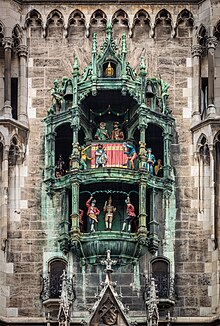
Summary
The Rathaus-Glockenspiel is a large mechanical clock located in Marienplatz Square, in the heart of Munich, Germany.[1] Famous for its life-size characters, the clock twice daily re-enacts scenes from Munich's history. First is the story of the marriage of Duke Wilhelm V to Renata of Lorraine in 1568, followed by the story of the Schäfflerstanz, also known as the coopers' dance.

History edit
The clock, with 43 bells and 32 life-size figures, was added during the completion of the Neues Rathaus (New Town Hall) in 1908.[2] Every day at 11 a.m. and 12 p.m. (as well as 5 p.m. from March to October)[3] the clock re-enacts two stories from Munich’s history from the 16th century, taking about 15 minutes.
The top half of the Glockenspiel tells the story of the marriage of the local Duke Wilhelm V (who also founded the noted Hofbräuhaus) to Renata of Lorraine (Renate von Lothringen). In honor of the happy couple, there is a joust with life-sized knights on horseback representing Bavaria (in white and blue) and Lothringen (in red and white); the Bavarian knight (Bayerische Ritter) wins.[4]
This is followed by the second story, the Schäfflertanz otherwise known as the coopers' dance, which plays out on the bottom half of the clock. This story depicts the end of a severe plague that took place in 1517. [5] The coopers are said to have danced through the streets, encouraging residents to leave their homes again after being frightened by the plague.[5][6] The coopers remained loyal to the duke, and their dance came to symbolize perseverance and loyalty to authority through difficult times. By tradition, the dance is performed in Munich every seven years. This was described in 1700 as "an age-old custom", but the current dance was defined only in 1871. The dance is performed during Fasching (German Carnival); it was performed in 2019.[4]
At the very end of the show, a very small golden rooster at the top of the Glockenspiel chirps quietly three times, marking the end of the spectacle.[4]
Restoration edit
In 2007 the glockenspiel underwent a restoration that was supported by the German Foundation for Monument Protection. [7]
References edit
- ^ "Munich" (web). EASY DESTINATION. Retrieved 2008-05-15.
- ^ "Rathaus-Glockenspiel". Atlas Obscura. Retrieved 2023-08-25.
- ^ "Glockenspiel im Neuen Rathaus". Retrieved 22 November 2018.
- ^ a b c Anderson, Stuart. "Munich Glockenspiel". Destination Munich. Retrieved 29 April 2016.
- ^ a b "Rathaus-Glockenspiel". Atlas Obscura. Retrieved 2023-10-26.
- ^ muenchen.de. "Das Neue Rathaus in München: Von Geschichte bis Architektur - muenchen.de". www.muenchen.de (in German). Retrieved 2023-10-26.
- ^ "Deutsche Stiftung Denkmalschutz - Rathaus-Glockenspiel - München". Deutsche Stiftung Denkmalschutz (in German). Retrieved 2023-10-26.
48°08′15″N 11°34′32″E / 48.13750°N 11.57544°E
External links edit
- An illustrated story about the Glockenspiel
- Waiting on the Glockenspiel
- Life-size characters: https://www.munich.travel/en/topics/urban-districts/glockenspiel-new-city-hall


